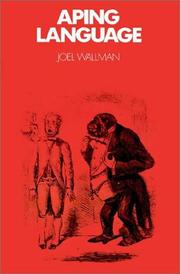| Listing 1 - 2 of 2 |
Sort by
|

ISBN: 9780521406666 0521404878 0521406668 9780521404877 9780511611858 0511611854 Year: 1992 Volume: vol *6 Publisher: Cambridge Cambridge University press
Abstract | Keywords | Export | Availability | Bookmark
 Loading...
Loading...Choose an application
- Reference Manager
- EndNote
- RefWorks (Direct export to RefWorks)
Language is regarded, at least in most intellectual traditions, as the quintessential human attribute, at once evidence and source of most that is considered transcendent in us, distinguishing ours from the merely mechanical nature of the beast. Even if language did not have the sacrosanct status it does in our conception of human nature, however, the question of its presence in other species would still promote argument, for we lack any universally accepted, defining features of language, ones that would allow us to identify it unequivocally ours from other species and contention over the crucial attributes of language are responsible for the stridency of the debate over whether nonhuman animals can learn language. Aping Language is a critical assessment of each of the recent experiments designed to impact a language, either natural or invented, to an ape. The performance of the animals in these experiments is compared with the course of semantic and syntactic development in children, both speaking and signing. The book goes on to examine what is known about the neurological, cognitive, and specifically linguistic attributes of our species that subserve language, and it discusses how they might have come into existence. Finally, the communication of nonhuman primates in nature is assayed to consider whether or not it was reasonable to assume, as the experimenters in these projects did, that apes possess an ability to acquire language.
Psycholinguistics --- Mammals --- Animal communication with humans --- Animal-human communication --- Animaux [Communication avec les ] --- Communicatie met dieren --- Communication animal-homme --- Communication avec les animaux --- Communication homme-animal --- Communication with animals --- Dier-mens communicatie --- Dieren [communicatie met ] --- Human-animal communication --- Language learning by animals --- Man-animal communication --- Mens-dier communicatie --- Apes --- Psychology --- Animal Communication. --- Primates --- -Human-animal communication --- Human communication with animals --- Animal communication --- Communication --- Human-animal relationships --- Animal communicators --- Hominoidea --- Animal Communications --- Communication, Animal --- Communications, Animal --- psychology. --- Human-animal communication. --- Psychology. --- Animal Communication --- psychology --- Arts and Humanities --- Language & Linguistics --- Apes - Psychology
Book
ISBN: 9789044715217 Year: 2006 Publisher: Aartselaar Zuidnederlandse Uitgeverij
Abstract | Keywords | Export | Availability | Bookmark
 Loading...
Loading...Choose an application
- Reference Manager
- EndNote
- RefWorks (Direct export to RefWorks)
591.51 --- 591.51.636.8 --- Katten africhten --- Kattengedrag --- 591.51 Psychology of animals. Animal intelligence. Instinct --- Psychology of animals. Animal intelligence. Instinct --- Animal communication with humans --- Animal-human communication --- Animaux [Communication avec les ] --- Communicatie met dieren --- Communication animal-homme --- Communication avec les animaux --- Communication homme-animal --- Communication non-verbale (Psychologie) --- Communication with animals --- Corps [Langage du ] --- Dier-mens communicatie --- Dieren [communicatie met ] --- Human-animal communication --- Langage corporel --- Man and animals --- Man-animal communication --- Mens-dier communicatie --- Mens-dier relaties --- Niet-verbale communicatie (Psychologie) --- Relationships [Human-animal ] --- Cats --- Behavior --- Human-animal relationships --- Body language
| Listing 1 - 2 of 2 |
Sort by
|

 Search
Search Feedback
Feedback About UniCat
About UniCat  Help
Help News
News